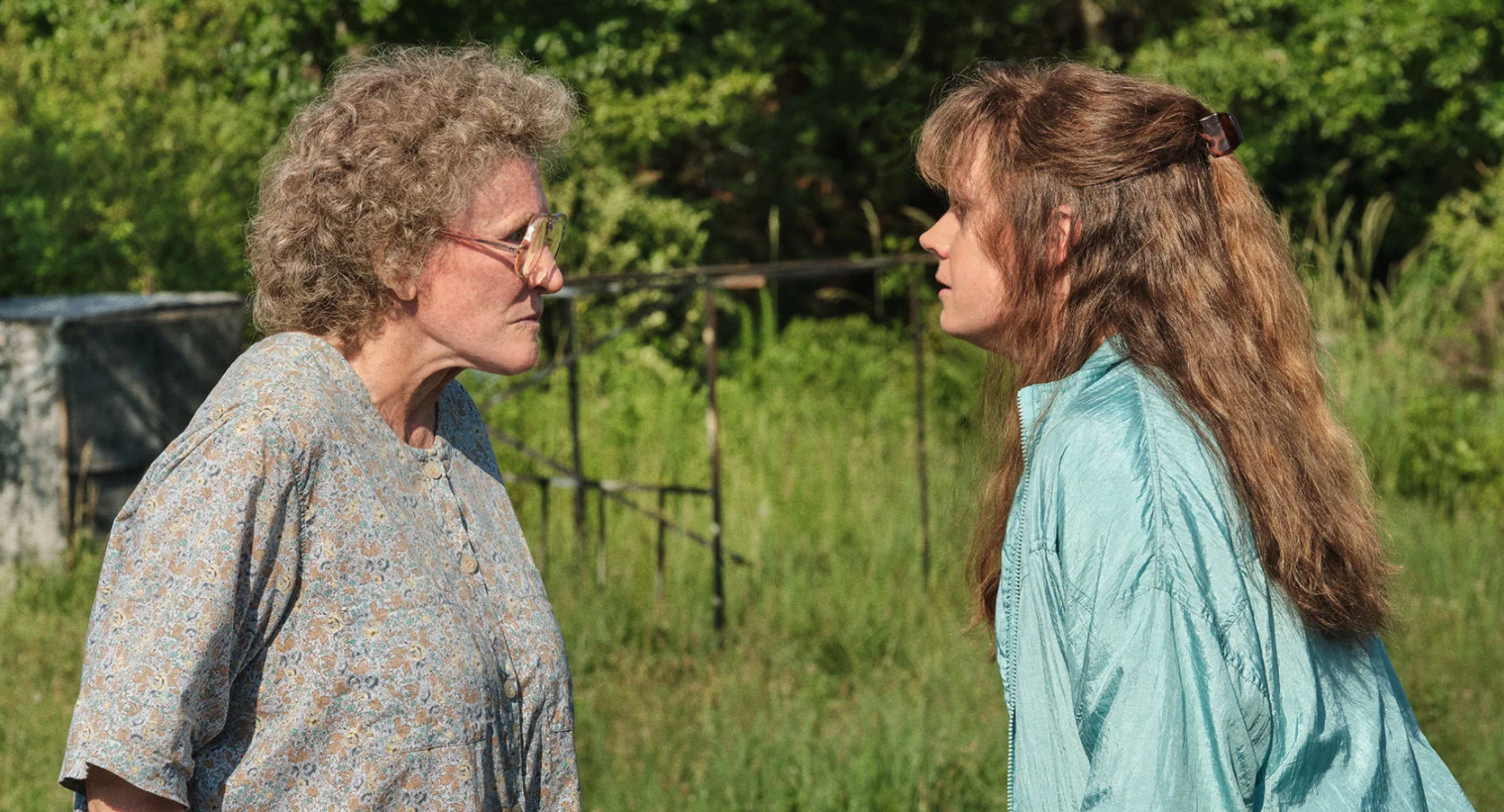“Here they are, it’s Wednesday…they’ve got nothing.” — CNN legal analyst Elie Honig.
Daily
Only 100% Flawless Scene…
…in an otherwise problematic film. For Close Encounters of the Third Kind, which I totally fell for when it opened 43 years ago, is chock-filled with irritations, annoyances, sugar highs, blatant contrivances and hard-to-swallow behaviors from beginning to end.
There are so many moments in CE3K that are either affected or close to nonsensical or impossible to swallow, that I realized about 13 years ago that there isn’t a single scene doesn’t miss in some way.
Except, that is, for the air-traffic controller scene near the beginning. Every element is spot-on. The dialogue, acting, framing and editing are dead perfect and exactly as they should be. And nobody’s “acting” — they’re just doing it. Especially David Anderson, the moustachioed black dude who’s talking with all the planes and pilots. Talk about owning.
“Close Encounters Deflation“, posted on 11.19.07: “I’ll always love the opening seconds of Steven Spielberg‘s once-legendary film, which I saw on opening day at Manhattan’s Ziegfeld theatre on 11.16.77. I wasn’t a New York journalist or even a Manhattanite at that stage. I’d taken the train in from Connecticut that morning.
“I still get chills thinking about that black-screen silence as the main credits fade in and out, plainly but ominously. And then John Williams‘ organish space-music sounding faintly, and then a bit more…slowly building, louder and louder. And then that huge orchestral CRASH! at the exact split second that the screen is filled with a fierce sandstorm, and we’re in the Sonoran desert looking for those pristine WW II planes without the pilots.”
Graham Greene’s “The Human Factor”
In a just-posted Reuters/Ipsos poll, nearly four out of five of Americans say President-elect Joe Biden has won the 2020 presidential election. Four out of five…not bad! Only 20% of Americans engulfed by denial or delusion!
Conducted from last Saturday (11.7) through yesterday (Tuesday, 11.10), the poll reported that 79% of U.S. adults believe Biden has definitely whipped Trump’s ass. Only 60% of Republicans believe that Biden won, however. Therefore two out of five righties have an argument with generally accepted fact.
In a similar-type Axolotl poll, an overwhelming majority of Americans — just under 90% — said they believe that (a) the sun will go down around 5:30 pm today and (b) that the weather will become colder as the nation moves into late fall and winter. Approximately 11% of poll respondents either flat-out denied these expected conditions or called the evidence vague and inconclusive.

Staying Power
Last night I posted a riff titled “Some People Lack Resonance.” The money line was that “the past never evaporates.” HE commenter “Sammy” took exception, asserting that “bad memories evaporate fairly rapidly whereas the good ones stay forever with you.” To which I responded, “You think?” I posted the following this morning:
Not sure how you’d define “bad” memories. but piercing, intense or blunt trauma ones last a lifetime.
I was playing outdoors with a young boy when we were both three or four, in some kind of rugged grassy area — possibly an empty lot, possibly a down-at-the-heels cemetery. We were running, and suddenly he’d fallen and badly cut his forehead on shards of glass. All I know is that in a flash his face was covered in blood. I’ve never forgotten the screams and howls and his father trying to comfort him while dabbing the blood with a rag or sponge of some kind.
Ditto the shrieks and screams of a very young neighborhood girl, Sue Ellen (whom I called “Swellin’”, or so my mom reminded me). Her parents had bought her a black cocker spaniel puppy, and suddenly one afternoon the poor thing was dead — squished flat as a pancake by a large truck that had been parked in front of her home.
I distinctly recall staring at the bloody, gutty remains with those big floppy ears flattened against the asphalt, and noticing with semi-horrified amazement that the puppy’s pink tongue had been pushed a good two or three inches out of his snout — the truck had lurched backward and a rear tire had caught the puppy in the hind leg region, and so the head was seemingly the last part to be crushed. Swellin’ either saw it happen and heard the yelp, or found the tiny, soaked, rug-like carcass immediately after. She may have been three or thereabouts. That trauma, trust me, has been with her ever since.
I may have been the same age one afternoon as I watched a neighbor with some kind of backyard-barn operation chop off a chicken’s head, and — stop me if you’ve heard this one — the chicken’s body striding or strutting around, or the legs kicking or whatever..
I was also around that age (or younger) with my mother one day in the car. After parking on a busy street with fast-moving traffic, she opened the driver-side door without looking or thinking and a speeding vehicle slammed into it and ripped the door off the hinges. I recall the sound of the impact and my mother’s shocked cry the instant it happened.
All my life these memories have been branded into my brain. Good memories also (love, warmth, kind voices, laughter, kitchen aromas) or epic sights like an entire nearby home being moved on a huge, slow-moving flatbed truck (“the house that moved”), but nothing leaves a durable impression like a shocking incident.
Some People Lack Resonance
There are the rote facts of life, the plain material truth of things, and then there are the currents within. The singing angels, the demons, the fireflies, the banshees, the echoes, the dreams, the fleeting recollections of childhood and even pre-birth consciousness…the vague sense of a continuing infinite scheme and how we fit into that.
We all define our lives as a constant mixing of these two aspects, but the charm and final value of a person, for me, is about how much he/she seems to be dealing with the interior world, and how much he/she refers to those currents and laughs about them, and basically lives on the flow of that realm.
Some go there more frequently or deeply than others, and some are just matter-of-fact functionaries who let their spiritual side (what little there is of that) leak out in small little droplets from time to time. Like it or lump it, but Hollywood Elsewhere is almost entirely about that moisture…not droplets or puddles or tide pools in my case, but trickling streams and maybe even ponds. The past never evaporates. Or at least, it doesn’t for me.
Days of Sensible Drinking
“There’s a theory that we [all] should be born with a small amount of alcohol in our blood, and that modest inebriation opens our minds to the world around us, diminishing our problems and increasing our creativity.” — opening line of an official boilerplate synopsis for Thomas Vinterberg‘s Another Round (Samuel Goldwyn Films, 12.4)
Speaking as one who happily sipped wine for decades before realizing it was no longer an option, I can say without question that alcohol really did seem to bring a certain glow and ebullience to my life. I used to think that civilized drinking was essential to a certain kind of joie de vivre. My European visits in the late ’90s and aughts were, I sincerely believed, immeasurably enhanced by the right kind of vino, especially when the bar or restaurant was lighted with candles.
I was never a pathetic, falling-down drunk, although I experienced some truly insane and hilarious episodes when I was buzzed. Especially in my 20s and early 30s. (Like falling asleep at a party in Marin County, and waking up in a sitting position in a large high-back chair with a half-full glass of Jack Daniels and ginger ale in my right hand.) I was almost never shit-faced (or at least not after high school), but at the same time my motto was “life would be unbearable without alcohol.” I was just having a good time. Breaking no laws, spilling nothing, getting away with it.
I’m especially glad that I got to carouse around Italy three or four times before I renounced. Drinking good wine in a sensible way can be wonderful.
My first cold-turkey renunciation happened in ’96 (I was mainly determined to quit vodka), but after two or three years I gradually started to sip wine from time to time, and it felt pretty cool for the most part. My last and final quit (no wine, no beer, no nothing) happened because nightly Pinot Grigio sippings had began to play hell with my looks, and because it gradually over-heated my personality and made me behave in an intemperate manner from time to time.
Sobriety isn’t easy at first, granted, but the morning wake-ups are wonderful, and you gradually learn how to smile and even laugh again. And that feeling of a terrible 700-pound wet gorilla no longer clinging to your back is heavenly.
There Are Demons In You

I just finished watching the Coen brothers’ The Ladykillers — a dark-humored remake of the 1955 British film of the same name.
A swindler professor (Tom Hanks) assembles a gang (Marlon Wayans, J.K. Simmons, Tzi Ma, Ryan Hurst) to rob a casino. The only way to enter the casino with money is through the basement of the house of a religious old woman named Marva Munson (Irma P. Hall). To implement his plan, the pseudo professor rents a room and a cellar from her for fake rehearsals of his musical ensemble.
The unsuspecting Marva, fascinated by the poetry professor, agrees and the gang secretly gets down to business. But very soon it becomes clear that the observational abilities of a religious elderly woman were clearly underestimated.
The word “fuck” is heard 89 times in the film. But of course, that’s not the subject of my story.
The Ladykillers includes a couple of musical gospel scenes, and these took me back to my distant childhood.

Nizhny Novgorod, Russia.
Click here for the remainder of the article at tatiana-pravda.com.
“Jap Anus Relations for $200”
I just watched the below out of respect for the recently departed Sean Connery and Alex Trebek. They left our earthly realm only nine days apart (10.31 and 11.8). I laughed out loud five or six times, which is more than I’ve laughed out loud at anything on SNL over the last two or three years.
What He Meant Was
In a 11.10 column titled “Amy Adams and Glenn Close’s Oscar Chances Try to Stand Above ‘Hillbilly Elegy‘”, Variety‘s Clayton Davis begins with the following sentence:
“In a time where the world is as polarized as ever, there seems to be a yearning to show oppression in all cultures. With Black Lives Matter gaining significant traction, a film about a Caucasian venture capitalist’s upbringing doesn’t feel exactly well-timed in our climate.”
HE translation: “At a time of peak wokeness in Hollywood — a time in which we’re all trying to rejuvenate if not overturn the old order and introduce a new political and social heirarchy that celebrates diversity and strong women and LGBTQs — forward-thinking Hollywood professionals would be wise to think twice about liking this film, mainly because it focuses on scurvy low-rent rurals in overalls, and nobody wants to celebrate this kind of thing at this point in time…right?”
All along I’d been nursing similar thoughts about Hillbilly Elegy. How could I sympathize with people whose views and politics I consider to be totally vile if not anti-Democratic, considering their unwavering support for an authoritarian Mussolini?
But the strangest thing happened when I finally saw Ron Howard‘s film. I stopped thinking of it as a journey into a nightmare filled with no-good polecat varmint Trump supporters, and instead as a portrait of stressed-out, hardscrabble, low-income types who feel stuck and unable to escape their lives. In short I felt twinges of sympathy and even compassion from time to time.
But that’s me.
Beyond Embarassment
“I just think it’s an embarrassment, quite frankly. How can I say this tactfully? I think it will not help the president’s legacy.”– Joe Biden speaking earlier today about Trump’s refusal to concede or approve the traditional transition process.
“”There will be a smooth transition to a second Trump administration.” — Secretary of State Mike Pompeo, earlier today.
“Hillbilly Elegy” Isn’t Too Bad
There’s no disputing that Glenn Close‘s snippy and snarly performance as “Mamaw” in Ron Howard‘s Hillbilly Elegy (Netflix, 11.11) will snag a Best Supporting Actress Oscar nomination. It’ll happen. Definitely. And for three reasons.
One, because the conviction she brings to her character, the brillo-haired grandmother of main protagonist J.D. Vance — the real-life author of the 2016 book that the film is based upon, and who’s played as a young adult by Gabriel Basso and as a pudgy teenager by Owen Asztalos — feels raw and real.
Two, because “Mamaw” is pretty much the hero of the film — the blunt-spoken, tough-love butch boss who saves Vance from the horrific influence of his angry, drug-dependent mom (Amy Adams).
And three, because Close is now oh-for-seven in terms of Oscar wins (her first nomination happened 37 years ago for her Jenny performance in The World According to Garp), and everyone knows this narrative can’t be left hanging in the air.
As for the film itself, well…it’s well-crafted. And earnest. It has some good portions, some decent currents. If you’re fair-minded enough to ease up and cut it a little slack, you could give Hillbilly Elegy a passing grade. I certainly didn’t come away from it saying, “well, that stunk!” I came away saying “okay, it may not be a personal top-tenner, but it is what it is and does what it sets out to do.”
Several weeks ago I began hearing that Hillbilly Elegy was a problem, but when I finally saw it I couldn’t help but say “okay, it has issues and Adams’ downswirling mom is a terrible person to hang with, but the story is the story — how J.D. escaped from Southern Ohio and learned to walk his own path despite a dysfunctional family upbringing and dispiriting cultural influences…so at the end of the day it’s not that bad, or not by my standards.”
The other day I called it a “familiar-feeling people movie” — a personal-struggle thing that lets the audience know right away that things will work out for poor J.D. How do we know this? Because of Hans Zimmer and David Fleming‘s score. It tells you “this movie is going to behave in a certain way…it’s going to observe certain boundaries and deliver certain emotional satisfactions.” And that it does.
Said satisfactions are also rooted in the mellowish story-telling instincts of director Ron Howard. His films have always had a considerate, carefully measured quality. Despite the Hammer horror current generated by Adams’ Beverly Vance character (which drives and occupies most of the narrative) Hillbilly Elegy ends up in a place of assurance and stability.
I can’t think of anything more to say, to be honest. I’ll add to this if something comes to mind.



